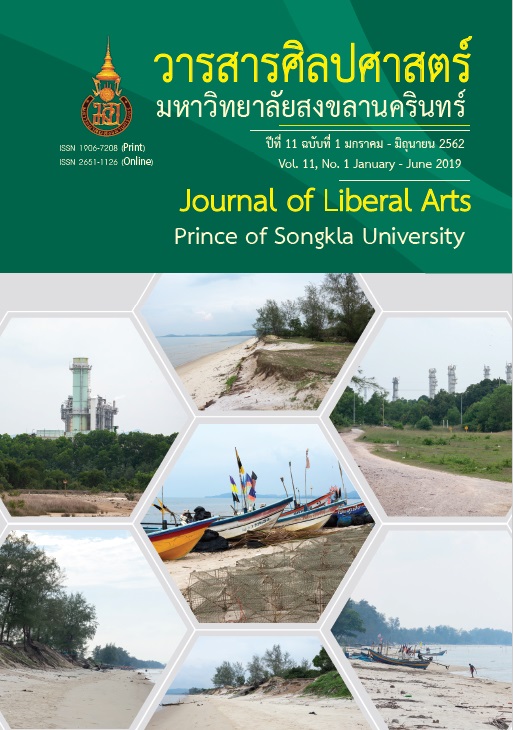The level of fiscal autonomy: Factors influencing quality of life of Thai people
Keywords:
fiscal autonomy, Fiscal decentralization, local government, quality of lifeAbstract
This research aims to study 1) the level of fiscal autonomy of local administrative organizations and the level of quality of life of Thai people and 2) to investigate factors influencing quality of life. In order to obtain all required information, the following secondary data was examined. 1) The provincial revenues databases B.E. 2555 (2012) for data on local fiscal autonomy, and 2) the provincial reports of the household socio-economic surveys (SES) B.E.2556 (2013) for data on the level of quality of life. The data were analyzed with stepwise multiple regression analysis. The results revealed that from all 75 provinces: 1) seven provinces (9.33 %) were with Local Administrative Organizations (LAOs) that had a high level of fiscal autonomy index: Samut Prakan, Phuket, Nonthaburi, Pathum Thani, Rayong, Samut Sakorn and Chonburi while five provinces were with Local Administrative Organizations (LAOs) that had a low level of fiscal autonomy index: Chai Nat, Uttaradit, Pattani, Narathiwat and Satun. 2) Education index, gross provincial products index and fiscal autonomy index were positively related to quality of life at a significance level of .01 while life expectancy index was negatively related to quality of life at a significance level of .01. Furthermore, gross provincial product index and fiscal autonomy index jointly predicted the quality of life at 84.60% with a significance level of .01.
References
Aboriginal Affairs and Northern Development Canada. (2015, April 25). Community well-being (CWB) Index. Retrieved from https://www.aadnc aandc.gc.ca/- eng/1100100016643/1100 100016644/.
Acemoglu, D. & Johnson, S. (2007). Disease and development: The effect of life expectancy on economic growth. Journal of Political Economy, 115(6), 925¬-985.
Ahmed, M. (2013). Fiscal decentralisation and political economy of poverty reduction: Theory and evidence from Pakistan. (Unpublished doctoral dissertation). University of Durham. UK.
Apreku, S. (2003). Does decentralization improve public service delivery? Issues and policy implications for Uganda. (Unpublished master’s thesis), Dalhousie University. Canada.
Arunsiriwong, N. (2013). Development of quality of life: Handbook of human resource management. Bangkok: Sukhothai Thammathirat Open University. [in Thai]
Becker, G. S. (1962). Investment in human capital: A theoretical analysis. Journal of Political Economy. 70, 9-49.
Department of Local Administration. (2014, July 30). Local finance and fiscal information: Revenue information of local administration in 2013. Retrieved from http://www.dla.go.th/work/ money/data/Summary_56.pdf. [in Thai]
Fieno, J. V. (2004). Federalism, decentralization and the welfare state in comparative perspective. (Unpublished doctoral dissertation), The University of Wisconsin–Madison. USA.
Gaeonale, J. K. (2002). Education policy: An investigation of the possible paths to decentralization in Botswana. (Unpublished doctoral dissertation), University of Bath. UK.
Jimenez, R. D. (2007). Decentralization and its impact on health and equity in health: Some theoretical considerations and applications to Canada. (Unpublished doctoral dissertation), The University of York. UK.
Kerk, G. & Manuel, A., (2010). Short survey of relevant indexes and sets of indicators–Sustainable development. Belgium: ANPED Northern Alliance for Sustainabilit.
Kleider, H. (2014). Decentralization and the welfare state: Territorial disparities, regional governments and political parties. (Unpublished doctoral dissertation), The University of North Carolina at Chapel Hill. North Carolina.
Krueathep, W., et al. (2014). Final report: Research project to monitor and evaluate the decentralization of Thailand. Bangkok: Office of the Decentralization to the Local Government Organization Committee, Office of the Permanent Secretary; the Prime Minister's Office. [in Thai]
Matheson & Azfar. (1999). Decentralization and social welfare in the minority provinces of the Philippines. Mimeo: University of Maryland.
Misau, S.A. (1983). Fiscal decentralization, fiscal equalization and the impact of grants on state government expenditures: A case study of Nigeria. (Unpublished doctoral dissertation), University of Leicester. UK.
National Statistical Office, Collector. (2014). Socio-economic survey: SES in 2013. [Data File]. Bangkok: National Statistical Office, the Prime Minister's Office, Thailand. [in Thai]
Oates, W. (1972). Fiscal federalism. New York: Harcourt Brace Jovanovich.
Office of the National Economic and Social Development Board. (2014). Thailand gross domestic product and gross provincial product 1960 – 2014. Bangkok: Prime Minister's Office of Thailand. [in Thai]
Patamasiriwat, D. & Pumkaew, D. (2014). Fiscal disparity in local governance and idea for grant allocation reform. Thammasat Journal, 33(2), 106 – 130. [in Thai]
Patmasiriwat, D. (2007). Finance and fiscal affairs for society: Empowering people. Bangkok: Public Policy Development Plan for a Better Life. National Health Foundation. Research funded by Thai Health Promotion Foundation (ThaiHealth). [in Thai]
Shakirova, R. (2013). The importance of institutional arrangements for development: A study of the relationship between decentralized governance and the provision of public education. (Unpublished doctoral dissertation), The University of Wisconsin–Madison. USA.
Tiebout, C. (1956). A pure theory of local expenditure. Journal of Political Economy. 64, 416-424.
Tirtosuhato, D. (2010). Regional competitiveness in Indonesia: The incentives of fiscal decentralization on state efficiency and economic growth. (Unpublished doctoral dissertation), George Mason University-Virginia. USA.
United Nations Development Programme (UNDP). (April 17, 2015). Human development index. Retrieved from http://hdr.undp.org/sites/default /files/2015_human_development_report.pdf
Varanyuwatana, S. (2013). New ways to develop Thai local revenue. Bangkok: College of Local Government Development, King Prajadhipok's Institute. [in Thai]
West, L. & Wong, C. (1995). Fiscal decentralization and growth regional disparities in rural China: Some evidence in the provision of social services. Oxford Review of Economic Policy. 11(4), 70 – 84.
Winkler, D. & Rounds, T. (1996). Municipal and private sector response to decentralization and school choice. Economics of Education Review. 15(4), 365–376.
Yao Yi. (2009). The impact of fiscal decentralization on growth, inequality and local governance in rural China. (Unpublished doctoral dissertation), Cornell University. New York.
Downloads
Published
How to Cite
Issue
Section
License
The authors retain the copyright to their article but the Journal of Liberal Arts, Prince of Songkla University reserves the exclusive rights to first publication.






